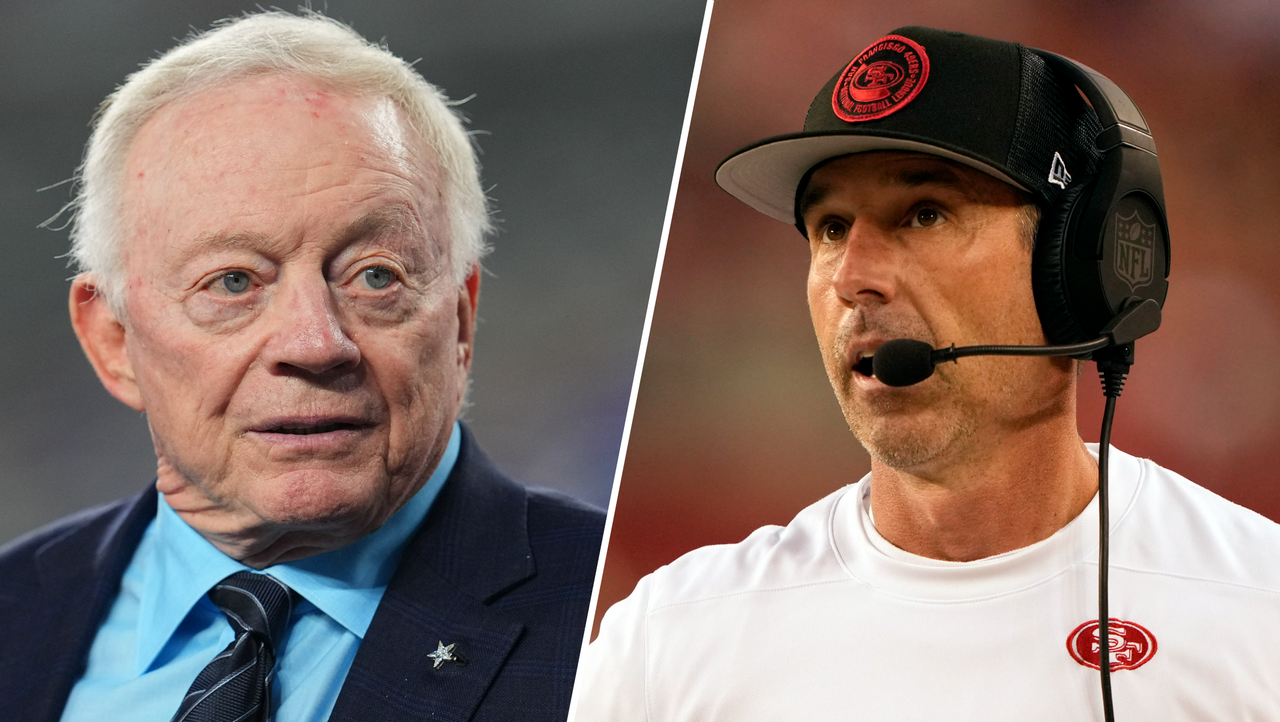Evidence of sports fanaticism trumping fiscal sanity has never been hard to find.
Fans’ desire to identify with their favorite teams — from plunking down money for overpriced team gear to spending thousands on autographs to paying through the nose for tickets — has known few financial bounds.
But the aftershocks of the current economic downturn are challenging that trend.
“There was a period of time when people thought sports was recession-proof or at least recession-resistant, and I don’t think it’s that way this time,” says Haynes Hendrickson, senior vice president of Turnkey Sports and Entertainment, a firm that tracks trends and moods in the fan marketplace.
Franchises, leagues, sponsors and, of course, fans are all feeling it. And the return on their investment in this form of entertainment is going to be scrutinized.
Pete McNally of Basking Ridge, N.J., is a 42-year-old commodities trader feeling that pinch. For years, he’s purchased New York Giants season tickets from a relative who’s been going to games since the 1950s, when the Giants played at the Polo Grounds.
But if McNally wants to assume those season tickets when the Giants, the reigning NFL champions, move into their new $1.3 billion stadium in 2010, he’ll have to make a decision that fans at the Polo Grounds never would have imagined. He’ll have to buy a personal seat license that allows him to “own” a seat in the Giants' new stadium. Only then will he be able to purchase season tickets.
Sports
The use of PSLs is not a new phenomenon. They came into vogue in the mid-1990s as a way to defray construction costs for new stadiums. Nearly half of NFL teams have PSL programs in place.
In the Giants’ case, the PSLs range from $1,000 to $20,000. If McNally wants a seat in the new stadium similar to the one he now uses, he’ll have to pay $7,500 for the PSL and then $400 per ticket for 10 games. If he wants to have two seats, that’s a $15,000 PSL outlay and $8,000 for one season’s worth of tickets — an initial investment of $23,000.
“I think it’s disgusting,” says McNally, who adds that he feels worse for longtime fans who have been season-ticket buyers through the good and the bad. “A lot of dedicated fans are asking, ‘When is enough enough?’ People are saying to themselves, ‘How do I justify $23,000 on Giants tickets?'
"And you try to logically talk yourself into it by saying it’s a good investment and you’ll have it for your kids when they get older, but you have to live in the now. There’s a lot you can do with $23,000. I know guys who have college right around the corner for their kids, and that’s a concern. It’s a hard sale right now to the family and the bottom line is, ‘Is it the right thing to do?’ ”
Even the players are aware of it.
“When I see a (bad) movie that I paid money to see, I voice my displeasure,” says New England Patriots linebacker Mike Vrabel, 33. “When the product on the field isn’t up to expectations, I understand people being upset with players. Is it right or wrong? I don’t know. But we’ve set a standard.
"I’ve got kids. Not every ticket we get is free. And when you pay money to do anything, it adds up. There’s tickets, food. … Look, it’s quite an expensive trip to the ballpark to have a couple of beers and enjoy yourself. Certainly, there will be people who see a bad performance that can say, ‘Man, there’s a lot of other things I could have spent a thousand dollars on.’ ”
Says noted sports economist Andrew Zimbalist, “Fans are not only scraping together the money to attend games, but you can’t diminish the significance that they have a lot more tension in their households and lives and are more likely to be venting at the team, other institutions and each other.”
According to leaguewide studies, the average ticket for an NFL game is $72.20, up from $25 in 1991.
With people watching their 401(k) and college funds taking major hits over the past month and a haze of uncertainty over the future of the economy, households will be monitoring their financial bottom lines more closely.
Says David Carter, executive director of USC’s Sports Business Institute, “Historically fans talked a big game, but ultimately they have not changed their habits. People complain and bitch then spend $10 for a beer. But now there’s a material impact on a family of four. They can say, ‘Are we going to go to an NBA game this weekend or are we going to make a minivan payment?’ "
An outgrowth of this money crunch, according to Carter, will be a flourishing secondary market for people unable to buy tickets for games in the past.
“If I have season tickets to the Cowboys and don’t want to give those up, I can sell off my tickets to the Redskins game and make my money back for the season if it’s a big enough game,” said Carter. “If season-ticket holders believe that if they get out they’ll never get back in, there’s pressure on them to stay. Season tickets are somewhat like real estate.”
But just as fans are looking at their bottom lines, franchises now have to as well.
“The credit crunch takes in everyone,” says Vrabel. “It doesn’t matter if you have a $150,000 mortgage or $150 million mortgage, everybody feels it.”
NEW STADIUM HEADACHES
On the other side of the coin McNally is considering are the Giants. They are trying to build a state-of-the-art stadium but have seen their interest rates on hundreds of millions of dollars in loans soar to as high as 22 percent in recent months.
According to Zimbalist, the building of Camden Yards in Baltimore in 1992 ushered in a new era of stadium building in which the stakes have risen steadily, with each new structure aiming to outdo the last in terms of character, amenities and opulence.
“We’ve had two decades of rapid expansion in professional sports,” said Zimbalist. “But (boom times) don’t go on forever in any industry, and you are going to hit a cycle of difficulty.”
The New York Yankees, New York Jets and Giants and Dallas Cowboys are all in the cycle right now. Each franchise is in the midst of constructing a new stadium with price tags of $1.6 billion, $1.3 billion and $1.1 billion, respectively. The Giants, Cowboys and New England Patriots all sold auction-rate bonds with adjustable rates to help secure money for their stadium mortgages.
But the collapse of the subprime mortgage market has leveled bond insurers. As a result, the interest rates on those bonds have ballooned to levels never anticipated.
As of March, the Giants were paying from 11.5 to 22 percent on $123.8 million in auction-rate bonds for their new stadium, according to Bloomberg News. The city of Arlington, Texas, where the Cowboys stadium is being built, is trying to refinance $164 million in bonds to a fixed rate. The interest rates, which had ranged from 3 to 4 percent since 2005, spiked to 9 percent this summer, and monthly interest-only payments rose from $500,000 to more than $1 million, according to the Fort Worth Star-Telegram.
It’s a bad time to be building a stadium. Which means these teams need to be inventive in trying to recoup their costs. The Jets have responded to this by planning an auction for later this week in which the 2,000 highest bidders for Coaches Club seats will allow them to “ stand on the field and watch the game, five yards off the Jets bench or step inside to a private 20,000-square-foot bar and lounge designed by Nobu architect David Rockwell,” according to the team.
“We have some battles now with PSLs and an interesting environment to play in that will play out,” Jets owner Woody Johnson told CNN.
The Cowboys, meanwhile, hope to reel in as much as $735 million by selling 55,000 PSLs at $2,000 to $150,000 per seat.
Meanwhile, finding corporate sponsors willing to spend freely on naming rights and other revenue generators promises to become more difficult with the belt-tightening going on.
Teams that aren’t building new facilities are responding in different ways. The Seattle Mariners recently announced they won’t raise ticket prices next season.
“We are anticipating some economic problems in the future,” said Mariners president Chuck Armstrong. “We have great trepidation for next season.”
The NBA’s New Jersey Nets are offering fans the chance to buy tickets now and not be billed until 2009.
Says Nets CEO Brett Yormark, “Given what's going on in the marketplace we thought we would introduce that kind of offer now.”
If there is an upside for fans in the economic crunch, it’s that there are deals to be had. And, according to Carter, they can expect fawning service from teams anxious to maintain the rolls of season ticket holders.
But leagues are anticipating a changing landscape.
Speaking last week in San Antonio, NFL commissioner Roger Goodell said, “We’re all feeling the pinch right now, some more than others, and it’s something we want to remain sensitive to.”
Ultimately, the changing economic landscape could affect the on-field product.
Carter sees a potential domino effect.
“In the past 15 years, leagues and owners have gained quite a bit,” he explains. “That’s no longer a possibility. The sheer cost of stadiums is going up and making it difficult for team owners to finance themselves. And … state and local governments have no appetite for spending taxpayer dollars on stadiums, which means stadium development will be hampered. The reason they are built in the first place is to develop an incremental revenue. When those stadiums are not being built and teams can’t make the money they’re accustomed to, the older buildings become less attractive to sponsors and fans and, with that, we may see a leveling off of player salaries.”
In the NFL, the owners have opted out of the current collective bargaining agreement and will likely ask the NFL Players Association to help share the burden they’re feeling by taking less. And that figures to be a hard and bitter battle.
Money is on everybody’s mind. And, as Carter points out, “if families are having (financial discussions about whether to go to games) professional sports teams better do a very good job of providing value.”
ANGRY FANS WILL REACT
On Sept. 21, for the first time in more than 22 months, the New England Patriots lost a home game at Gillette Stadium.
And they didn’t just “lose.” They got embarrassed, 38-13, by a Miami Dolphins team that had won once in its previous 21 games.
As that game slogged toward its conclusion, an unfamiliar sound was heard. Some Patriots fans, accustomed to a higher level of performance, began to boo the home team. It didn’t go unnoticed.
Ellis Hobbs, a 25-year-old cornerback for New England, reacted after the game to the booing by saying, “It amazes me how people react. You would think this organization hasn’t won as much as they have, and been as successful. … It’s a testament to how spoiled (the fans) are that expectations are that high, that we’re not allowed a bad game or something like that. How many times has someone had a bad day at the office?”
The flip side of that question is: How many times has a family of four spent $1,000 on tickets, parking, food, drinks and souvenirs to watch an unnamed "someone" have his bad day at the office?



